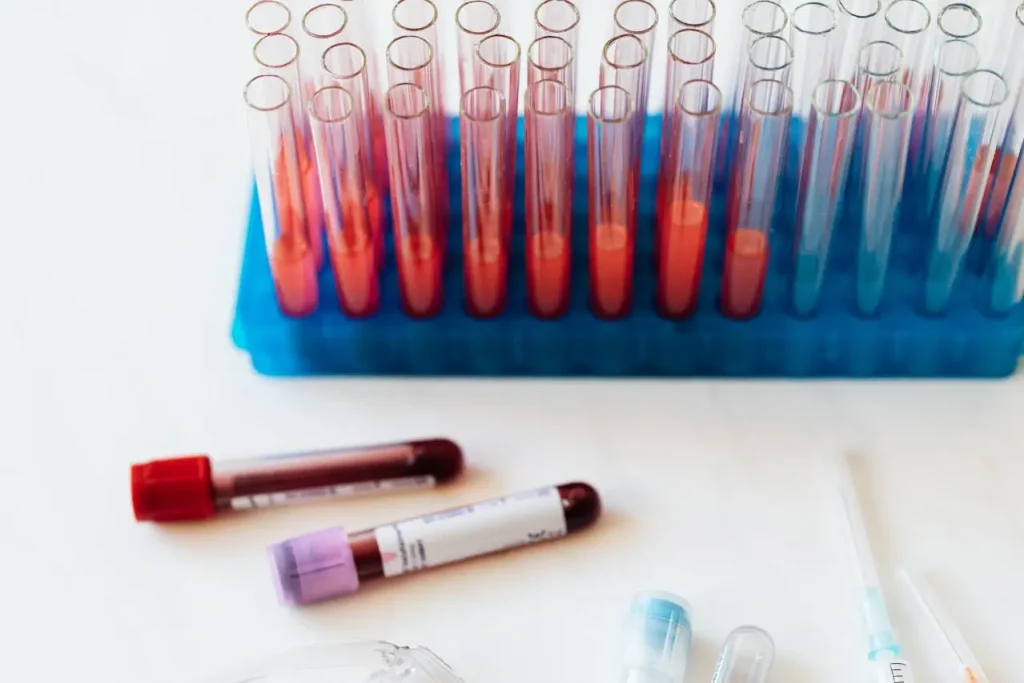All You Need to Know About Blood Tests: An In-Depth Look

Blood tests are pivotal in the realm of healthcare, serving as essential tools for monitoring overall health and diagnosing a range of medical conditions, from anemia to diabetes. By analyzing components like red blood cells, hemoglobin, glucose, and cholesterol levels, these tests offer insights into the body’s condition, guiding both preventive care and the management of diseases. While seeing variations in results, such as altered potassium or sodium levels, does not immediately point to severe health issues, it prompts further investigation to ensure optimal well-being.
This exploration into blood tests will delve into their significance, various types, and the process involved in undergoing one. It aims to equip readers with knowledge on interpreting results and understanding how blood tests help diagnose common conditions, including anemia, diabetes, and HIV. Through this comprehensive guide, individuals will gain a clearer perspective on the critical role blood tests play in health management and disease prevention.
What Blood Tests Are and Why They Are Important
Blood tests serve as a fundamental component in the diagnosis and management of various health conditions. These tests are capable of measuring or examining a wide array of substances present in the blood, including but not limited to:
- Cells and Chemicals: Red blood cells, white blood cells, platelets, and plasma components.
- Substances: Glucose, minerals (such as sodium and potassium), fats, vitamins, hormones.
- Markers: Inflammatory markers, tumor markers, genetic markers.
- Other Parameters: Toxins, drugs, and oxygen levels.
The significance of blood tests extends beyond mere detection; they play a crucial role in:
- Diagnosing Diseases and Conditions: By identifying specific markers or abnormalities in the blood, healthcare providers can diagnose diseases such as diabetes, anemia, and HIV.
- Monitoring Chronic Diseases: Regular blood tests can track the progression or remission of chronic conditions, allowing for timely adjustments in treatment plans.
- Evaluating Organ Function: Tests can assess the health and functionality of vital organs like the liver, kidneys, and heart.
- Detecting Clotting or Bleeding Disorders: By analyzing clotting factors, blood tests can identify risks of excessive bleeding or clot formation.
- Assessing Immune System Health: Blood tests can reveal how well the body’s immune system is fighting infections or if there are autoimmune disorders present.
It’s noteworthy that blood tests inform approximately 70% of medical decisions, highlighting their indispensable role in the healthcare process. This reliance is due to their ability to:
- Guide Treatment: Physicians rely on blood test results to make informed decisions regarding the most appropriate course of treatment for their patients.
- Early Detection: Screening through blood tests can identify health issues in their nascent stages, often before symptoms manifest, enabling early intervention.
- Medication Monitoring: For patients on long-term medication, blood tests can ensure that the medicines are effective and not causing harmful side effects.
The process of conducting these tests involves sophisticated equipment and skilled technicians. Despite the complexity behind the scenes, the outcome of a blood test is a critical tool in a healthcare provider’s arsenal for patient care. It’s also important to understand that while blood tests can reveal a lot about one’s health, abnormal results do not always signify a serious medical condition. They are, however, a prompt for further investigation to either confirm a diagnosis or to rule out potential health issues. With over 100 types of blood tests available, ranging from simple glucose tests to comprehensive panels, the specific test or combination of tests ordered by a healthcare provider will depend on the individual’s health status, symptoms, and medical history.
Understanding the Different Types of Blood Tests
Blood tests are instrumental in diagnosing and managing health conditions, with each type serving a specific purpose. Here is an overview of the different types of blood tests and what they measure:
- Complete Blood Count (CBC):
- Components Measured: Red blood cells (RBCs), white blood cells (WBCs), platelets, hemoglobin, hematocrit, and mean corpuscular volume (MCV).
- Purpose: Evaluate overall health and diagnose conditions like anemia, infection, and immune system disorders.
- Blood Chemistry Tests/Basic Metabolic Panel (BMP):
- Components Measured: Glucose, sodium, potassium, bicarbonate, chloride, blood urea nitrogen (BUN), and creatinine.
- Purpose: Check kidney function, blood sugar levels, and electrolyte balance.
- Comprehensive Metabolic Panel (CMP):
- Components Measured: Includes all BMP components plus additional proteins and liver function indicators.
- Purpose: Provides a broader view of body metabolism, liver and kidney function, and electrolyte balance.
- Lipid Panel:
- Components Measured: Total cholesterol, LDL (bad) cholesterol, HDL (good) cholesterol, and triglycerides.
- Purpose: Assesses heart health and risk for cardiovascular diseases.
- Blood Clotting Tests:
- Components Measured: Proteins affecting the blood clotting process.
- Purpose: Monitors blood clot risk and effectiveness of anticoagulant therapy.
- Blood Enzyme Tests:
- Components Measured: Enzymes like troponin and creatine kinase (CK).
- Purpose: Detects muscle damage and heart attack.
- Specialized Tests:
- Thyroid Panel: Measures thyroid hormone levels to check for thyroid disorders.
- Cardiac Biomarkers: Identifies heart injury or failure through specific enzyme levels.
- Sexually Transmitted Infection (STI) Tests: Diagnoses conditions like HIV, syphilis, and hepatitis C.
- Coagulation Panel: Evaluates blood clotting ability.
- C-reactive Protein (CRP) Test: Measures inflammation levels in the body.
Each type of blood test provides crucial information about different aspects of health, from organ function and disease diagnosis to risk assessment for certain conditions. Understanding these tests and what they measure is essential for interpreting results and making informed health decisions.
The Process of Getting a Blood Test
Preparing for a blood test involves several steps to ensure accuracy and comfort during the procedure. Here is an essential checklist to follow before your appointment:
- Diet and Hydration:
- Fast for 9-12 hours if required by the specific test.
- Avoid alcohol, fatty or rich foods, and caffeine.
- Stay hydrated by drinking plenty of water.
- Clothing and Personal Items:
- Wear short sleeves or loose-fitting clothing for easy access to the arm.
- Bring your insurance card and identification.
- Consider carrying a small snack for after the test.
- Timing and Comfort:
- Try to schedule your appointment when the lab is least busy.
- Get plenty of sleep the night before the test.
During the blood draw procedure, the technician will perform the following steps:
- Preparation: Clean the area with an antiseptic wipe and tie an elastic band around your arm to make the veins more visible.
- Blood Draw: Gently insert a needle into your arm to collect the required amount of blood.
- Aftercare: Once the blood has been drawn, the technician will remove the needle, apply a small bandage over the area, and advise you to keep the bandage on for a few hours to prevent bleeding.
Post-procedure care is crucial to avoid complications and ensure comfort:
- Drink plenty of water to stay hydrated.
- Avoid strenuous exercise for the rest of the day.
- If bruising occurs, apply ice wrapped in a towel for 15-30 minutes several times on the first day, switching to warm, moist heat after that.
- Contact your physician if you experience more than minor discomfort after the first day.
Understanding when to expect your results is also important. Most common blood tests, such as the Complete Blood Count (CBC), will have results available from 24 hours to a few days later. It’s advisable to speak with your doctor or laboratory technician to know when to expect the results and if any specific preparations are needed for your test. Some facilities, like Sonora Quest Laboratories, offer services like My Lab ReQuest, allowing you to order tests without a doctor’s order and pay a discounted rate at the time of service. Results for these tests are typically available within three to five days following the blood draw.
Interpreting Blood Test Results
Understanding blood test results is crucial for making informed health decisions. These results can shed light on various aspects of health, from organ function to potential infections. Here’s a breakdown of key components often seen in blood test results:
- Abbreviations and Units: Blood test results come with specific abbreviations and units, such as:
- cmm (cells per cubic millimeter)
- fL (femtoliter)
- g/dL (grams per deciliter)
- IU/L (international units per liter)
- mEq/L (milliequivalents per liter)
- mg/dL (milligrams per deciliter)
- mL (milliliter)
- mmol/L (millimoles per liter)
- ng/mL (nanograms per milliliter)
- pg (picograms)
Understanding these units is essential for interpreting the numbers accurately.
- Interpreting Cell Counts:
- A high WBC (White Blood Cell) count may indicate an infection or inflammation.
- A low WBC count could suggest conditions such as HIV, leukemia, hepatitis, or arthritis.
- Red Blood Cells (RBCs), hemoglobin, and platelets are also critical markers. For instance, low hemoglobin could indicate anemia.
- Test Results Interpretation:
- Negative or Normal Results: Indicate the absence of the germ, substance, or gene the test was searching for.
- Positive or Abnormal Results: Suggest the presence of the germ, substance, or gene in your sample.
- It’s important to note that factors such as diet, medication, exercise, and even menstrual cycles can affect test outcomes.
Factors Influencing Test Results:
- Diet and Hydration: Eating or drinking certain foods and beverages before a test can alter results.
- Medications and Supplements: Some can impact the levels of substances in the blood.
- Physical Activity: Strenuous exercise before a test can influence certain markers.
- Menstrual Period: Hormonal fluctuations can affect test outcomes.
Lastly, while home tests offer convenience, they should not replace professional testing ordered by healthcare providers. Home tests might provide preliminary insights but lack the comprehensive analysis and context that healthcare professionals can offer. Always discuss any concerns or abnormal results with a healthcare provider to understand the implications fully and to determine the next steps in care or treatment.
Common Conditions Diagnosed Through Blood Tests
Blood tests play a crucial role in diagnosing a wide range of common conditions, offering insights into the body’s internal workings and highlighting potential health issues. These tests measure various components in the blood, each providing valuable information on different health aspects. Below is a detailed look at some common conditions diagnosed through blood tests, along with the specific components measured and their significance:
- Cardiovascular Health:
- Cholesterol and Triglycerides: High levels may indicate a higher risk of coronary heart disease.
- Substances Indicating Heart Muscle Damage: Certain enzymes and proteins in the blood can signal heart conditions.
- Blood Disorders:
- Complete Blood Count (CBC): Abnormal levels may signal dehydration, anemia, infection, blood cancer, immune system disorders, or clotting disorders.
- Hemoglobin Variations: Detects variations like hemoglobin S, C, or E, common in specific ethnic backgrounds, indicating conditions like sickle cell disease or thalassemia.
- Infectious Diseases:
- HIV/AIDS: Blood tests such as the Antibody screening test, Antigen combination test, and Nucleic acid test are used to detect the AIDS virus.
- Hepatitis C: A specific blood test can determine infection with the Hepatitis C virus.
- Organ Function and Chronic Conditions:
- Liver and Kidney Tests: Measure enzymes and waste products to assess organ health.
- Diabetes: Glucose levels in the blood can diagnose diabetes.
- Cancer Detection:
- Cancerous Proteins and Cells: Blood tests can help detect the presence of cancerous substances.
This information underscores the versatility of blood tests in diagnosing various health conditions, from cardiovascular issues and blood disorders to infectious diseases and organ function. Blood tests can also identify markers of diseases such as diabetes, HIV, anemia, and cancer, providing a comprehensive overview of an individual’s health status. It’s essential for individuals to undergo regular blood testing as part of their health monitoring regimen, as early detection of abnormalities can lead to timely intervention and treatment.
Conclusion
Throughout this article, we have delved into the critical role of blood tests in the contemporary healthcare landscape, highlighting their indispensable value in diagnosing and managing numerous health conditions. From understanding the various types of blood tests and what they measure, such as glucose levels, electrolyte balance, and markers for chronic illnesses, to grasping the nuanced process of preparing for and undergoing a blood test, this comprehensive exploration has equipped readers with the knowledge needed to make informed decisions about their health. Moreover, we have illuminated how results from these tests can inform treatment strategies, detect diseases in their early stages, and monitor the effectiveness of ongoing therapies, reinforcing the principle that timely and regular blood testing is a cornerstone of effective health management.
The significance of blood tests extends beyond the immediate outcomes, offering a window into the body’s intricate systems and signaling potential health concerns before they manifest into more severe conditions. By understanding the implications of test results, patients are empowered to engage proactively with their healthcare providers, fostering a collaborative approach to health maintenance and disease prevention. As such, blood tests stand as an essential tool in the medical arsenal, facilitating early detection, guiding therapeutic interventions, and contributing to the broader objective of achieving optimal health outcomes. It’s evident that, through informed participation and regular monitoring, individuals can significantly enhance their well-being, underscoring the profound impact of blood tests on individual and public health.


